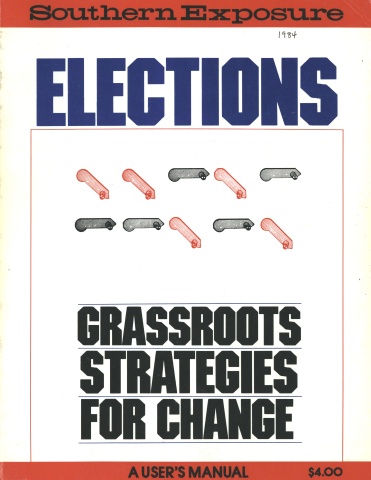Reclaiming the New South

This article originally appeared in Southern Exposure Vol. 12 No. 1, "Elections: Grassroots Strategies for Change." Find more from that issue here.
Henry Wallace, a white Progressive Party candidate for the American presidency in 1948 (see article on p. 94), spoke out with unprecedented fervor against segregation, Jim Crowism, and black disfranchisement. His populist philosophy and ideals and the substance of his speeches delivered across the nation during his campaign tour made him the target of harassments like red baiting and cross burnings.
On August 29, 1948, Wallace addressed members of the Progressive Party in Richmond, Virginia, protesting segregation and poll taxes and the Dixiecrats and "Trumancrats" who perpetuated them. The Dixiecrats were white Southerners who bolted the Democratic Party when Truman ran for president, considering him far too liberal. The Dixiecrat candidate for president, Strom Thurmond, ended up with 1,169,021 votes, almost all from the South, and 38 electoral votes. Wallace got 1,157,172 votes, mostly from outside the South, and no electoral votes. The following is excerpted from the Richmond speech.
The Dixiecrats are an invention to make the Trumancrats look liberal. The Dixiecrats are an invention to divert the people of the South from real problems to false ones, from high prices to hot words, from the great issue of war and peace to the rantings of demagogues. There is a new party in the South — but it is not the Dixiecrats. For the first time in almost 100 years, a new party has been started in the South. Men and women of all stations . . . of all races and creeds, are standing together to fight within the ranks of the Progressive Party for their dream of abundance. For the first time the men and women of the South . . . are forging an instrument to achieve political freedom for Negro and white together, to advance to an American standard of living. . . .
The men who have held the South in bondage for so many years are frightened. They must retain their poll tax barriers to political freedom. They must retain their wage differentials and the flow of their dividends out of the South. They must wield the club of segregation to defend their profits. The Democratic Party . . . is now facing a new tide — a Progressive Party which threatens to wash away their vested interests.
So they conjure up the Dixiecrats and they prepare a diversionary circus. But look at them closely and compare them with the men in the Southern machines that have stayed inside the Democratic Party. Do they differ on the cold war? Not in the least. Do they differ by as much as a hair on keeping high prices? Not so you can notice. Do they differ in their bitter opposition to labor unions and their support of Taft-Hartley? Not by their votes. On none of these fundamental issues does a Byrd differ from a Wright.
Do they even differ on the subject of civil rights? The answer is right here in the state of Virginia; not once has a Byrd or a Smith who stayed with Truman voted any differently on civil rights measures than those who deserted him to form the Dixiecrats.
No, they are quite content to stay in the Democratic Party. They know . . . that the Democratic Party is the most important instrument to defeat civil rights legislation. They know the segregation order is not an order; they know the bar to discrimination in the federal service is meaningless; they know that Truman's deeds on civil rights have never matched his words. . . .
If Truman meant really to strike at the evils of discrimination and segregation that rob the people of the South, both Negro and white, of half their wages, their health, and their education, he would summarily reject the support of a Byrd. But when we find that Truman and his managers not only accept but court the reactionary Southern machines, the defenders of privilege and the preachers of hate, we know there is no real gulf between the Dixiecrats and the Trumancrats.
In and outside the Democratic Party, the Dixiecrats serve a useful function. Byrd is a most vigilant defender of the people's money when that money is needed for schools or housing or social security — and just as ardent a spender for greater armaments as Truman. Byrd fights against federal bureaucracy, but his own machine rests on a larger number of office holders per capita than any other state. And most of them spoilsmen. New roads are too expensive, new schools an extravagance; flood control and power development will soften the fiber of the people. But arms and draft laws in peacetime and building for war — on those Byrds and Trumans, the Wrights and Thurmonds, join with the Tafts and Deweys. . . .
A New South is rising. But the tide of that New South has been held back by a wall of privilege resting on the twin pillars of segregation and poll taxes. We in the Progressive Party are here to reclaim that New South, to regain its precious heritage of freedom and equality. We say that some part of that rich Southern treasure must be returned to help build the South. We say that no man anywhere in the land must work for less than a dollar an hour and that such a minimum must be written into the law. We say that the giant corporations that have drained off the income of the South must be taxed to build the schools and the roads and the hospitals the South needs. We say that un-American, anti-democratic practices of discrimination and segregation must go — and with them the one-party system that has borne an instrument for exploiting the people of the South.